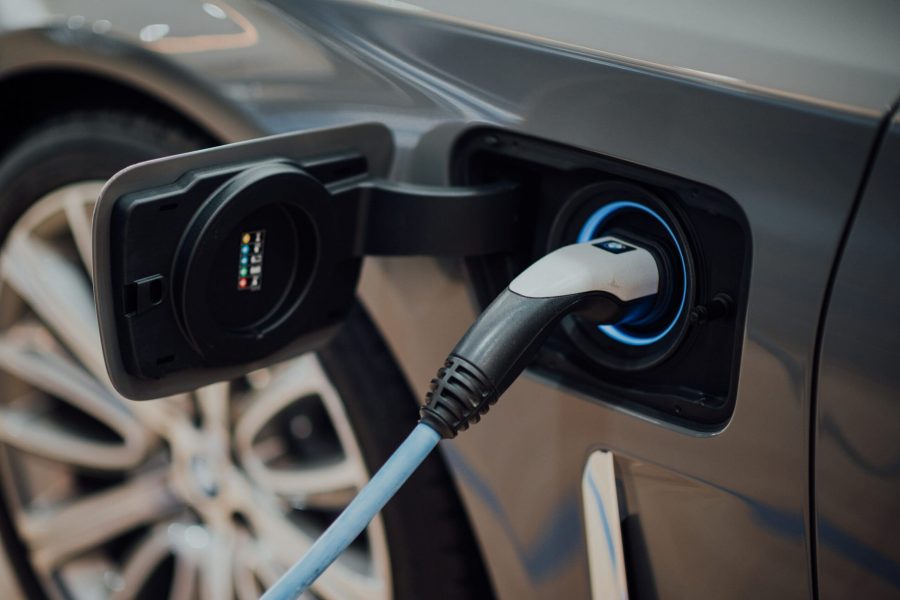E-cars such as a Tesla Model 3 or the BMW iX are becoming increasingly popular and are now more and more common in company fleets. One way to test the use and suitability of e-vehicles in the fleet in advance is the car subscription. More and more fleets are taking a liking to the concept, as new technologies can be tested without obligation or delivery times for new vehicles can be bridged.
In this article, we explain the advantages and disadvantages of a car subscription for e-vehicles in your fleet. We also take a closer look at the various factors that should be considered when deciding for or against an e-car on subscription.
What is an e-car subscription?
An electric car subscription is a type of rental agreement for an electric vehicle that allows a company to use the car for a fixed period of time. Usually, the car (e.g. the Tesla Model Y) is provided by a car manufacturer, a car rental company or a specialized car subscription provider and the client pays a fee per month for the use of the car.
How does an e-car subscription work?
With a subscription for electric cars, there is no long contract commitment and the electric car can simply be returned or exchanged for another one at any time. The monthly installment usually includes all costs incurred in connection with the car. These include taxes, insurance and maintenance. The electricity and charging costs are generally not included and must be borne by the subscriber. Some subscription contracts include a limited number of free kilometers per month, up to which no additional costs are incurred.
In order to take out a car subscription for electric cars, the company sometimes has to make a down payment and undergo a credit check. Once this process is complete, the vehicle can either be picked up at a pick-up station or simply delivered to your front door
What are the advantages of an e-car subscription compared to buying or leasing?
A subscription with electric cars is a good option for companies that are not yet sure whether they want to use electric cars in their fleet permanently. This gives them the opportunity to try out the use of e-cars without obligation, without having to worry about purchasing, financing or maintenance. You can then decide whether the permanent purchase of electric cars as company cars or pool vehicles is a good investment.
Another advantage of the electric car subscription is that there is no long contract commitment and, unlike long-term leasing or financing contracts, the car can be returned at any time. This gives companies sufficient flexibility if requirements change at short notice. A car subscription also saves time and effort, as the provider takes care of the vehicle’s insurance, maintenance and repairs.
However, there are also disadvantages to electric car subscriptions. If the car is used over a longer period of time, the subscription is usually more expensive than leasing a commercial vehicle. Those who return the e-car early are usually not reimbursed for fees already paid. It is therefore important to carefully weigh up the pros and cons of the car subscription for electric cars and compare them with the conditions for leasing or buying the vehicle.
What costs are included in the monthly fee for an e-car subscription?
The monthly payment for an electric car subscription includes almost all costs associated with the car.
The monthly installment usually covers:
- Use of the car: You pay a monthly fee to the provider for the use of the car and can also offer the vehicle as a pool vehicle in the fleet during the term.
- Agreed mileage: As already mentioned, some providers offer a limited number of free kilometers per month.
- Taxes: Vehicle taxes and GEZ fees are usually also included in the subscription.
- Insurance: Insurance for the e-car, such as third-party car insurance or partial and fully comprehensive cover, is also included in the monthly rate. As the exact scope of cover can vary, you should check the terms and conditions of the contract in advance.
- Maintenance and inspections: The regular maintenance of the car, such as changing tires. Oil changes are also covered by the monthly installment. In some subscription contracts, spare parts for the electric car are also included in the monthly rate.
- Service hotline and roadside assistance: In addition to a support hotline to help with questions or problems, many providers also offer roadside assistance and towing services to help you in the event of a breakdown or accident. Some providers also provide a replacement vehicle in the event of a claim.
Costs are usually not covered for:
- Additional kilometers: If you drive the electric car beyond the number of kilometers specified in the subscription, you may incur additional costs per month.
- Fuel and charging costs: As electric cars are vehicles with an electric motor, there are of course no refueling costs for the vehicle. On the other hand, there are costs for charging the battery when the car is charged at public charging stations. These costs are not included in the monthly installment with the provider.
- Car care: The provider does not bear the costs for vehicle care and windshield wiper fluid.
- Damage: If the car is damaged, repairs or replacement parts may have to be paid for. In addition, the deductible of the comprehensive insurance may become due.

Is there a minimum term or notice period for an e-car subscription?
The short minimum terms make subscription models particularly attractive for fleets that only need to cover their mobility requirements in the short term. For example, to bridge delivery times for new company vehicles or to cover temporary requirements.
The minimum term and notice periods for an e-car subscription vary depending on the provider. While some subscriptions start with a minimum term of three months, with Fleethouse you can take out flexible subscriptions with a term starting at one month. The only thing to note here is the 30-day notice period. Subscriptions with a fixed term, e.g. 6 months, end automatically.
What requirements do I need to meet to take out an e-car subscription?
The exact requirements vary from provider to provider. Before a car subscription is taken out, a credit check is usually carried out to assess the company’s creditworthiness.
Drivers must fulfill these requirements, among others:
- be in possession of a valid identity document
-
meet the minimum age requirement, which is usually 18 years
-
A maximum age is also possible
- have a valid driving license (in the EU) that does not expire during the subscription period
Car subscription module
Subscribe to the next company vehicle with Fleethouse. Together with FINN, we offer you an all-round carefree mobility package.
How do I pick up and return the e-car?
During the ordering process, you have the option of selecting a delivery day for the e-car. As a rule, this is confirmed by the respective provider in a separate e-mail notification. If you take out a car subscription via Fleethouse, the vehicle you have subscribed to will be delivered free of charge by our partner FINN to the address of your choice. When the vehicle is handed over, a handover report is filled out to document the condition of the vehicle at that time.
You will receive a reminder by e-mail before your car subscription expires and your car is due to be returned. In the case of Fleethouse, you can then have the vehicle picked up for a fee or return it to a FINN partner location free of charge.
What are the operating costs for an e-vehicle as a company car?
In comparison, the operating costs for an electric car are lower than those for a car with a combustion engine. This is because there are no gasoline or diesel costs for driving and the maintenance costs are lower. However, the purchase or leasing costs for an electric car can be higher. It is therefore important to carefully weigh up the operating costs per month for an electric car compared to other fleet vehicles before making a purchase decision after subscribing. The operating costs for an electric car as a company car depend on various factors, such as
- Size and weight of the car: The larger and heavier the car model, the more energy is required to accelerate and move it. This can have an impact on operating costs.
- Efficiency of the car: The more efficient the electric car is, the less energy is needed to operate it.
- Distance that is driven: The longer the distance, the more energy the vehicle requires.
- Cost of electricity: The cost of electricity can vary depending on the region and provider.
- Maintenance costs: Electric cars have fewer moving parts than combustion engines, which means less maintenance is required. However, electric cars also have maintenance costs, such as for changing tires and brake pads, which wear out more quickly.
What needs to be considered with charging infrastructure and load management?
Overall, there are a number of factors that need to be considered when introducing and using electric cars in a fleet. It is important to plan carefully and take all the necessary precautions. This ensures that the use of e-cars in the fleet runs smoothly.
- Charging infrastructure: In order to use electric cars in the company, a suitable charging infrastructure is required. This may mean that charging stations need to be installed at the workplace so that vehicles can be charged during working hours. If electric company cars are to be used outside of working hours, public charging stations must also be used or a charging station installed at the employee’s home. However, if you have only purchased an e-vehicle for a few months on subscription, it makes less sense to have your own charging station. In this case, you can initially use public charging stations.
- Load management: If several electric cars are to be purchased in the company, load management systems may also need to be used to ensure that the power supply is not overloaded and power outages are avoided.
- Planning and coordination: Good planning and coordination are important to ensure that every electric car can be used effectively. This includes planning the routes of the drivers in advance and ensuring that the vehicles are loaded in good time so that they are ready for the planned journeys.
- Training: Employees must be trained in how to use the electric cars safely and effectively and how to charge and properly maintain the cars depending on the model.
The car subscription for electric cars from Fleethouse and FINN
With Fleethouse, commercial customers can now easily take out a car subscription for electric cars and flexibly supplement their fleet with sustainable vehicles to suit their needs. Our partner FINN Auto offers a large selection of high-quality and popular electric vehicles at attractive subscription conditions. Other advantages that FINN offers our commercial customers when subscribing to e-cars:
- All-round carefree package: You simply subscribe to your new electric vehicle at a fixed monthly price including insurance and much more. FINN does not require a deposit and has no hidden costs.
- Short terms: You decide how long you subscribe to your new e-car. FINN starts with a term of one month.
- Free doorstep delivery: Our provider FINN will deliver your new electric vehicle directly to your doorstep free of charge.
Our conclusion
A car subscription is a simple and flexible alternative to buying or renting an e-car. It offers the opportunity to test the use of electric cars in the fleet without having to worry about maintenance, insurance or repairs. All ancillary costs are already included in the monthly rate.
By subscribing to an e-car, you have the freedom to switch to another vehicle at any time if you are not happy with your choice. The first month a Tesla Model 3, the next a BMW iX – the choice is yours.
Short terms (from one month) allow you to cancel your subscription to FINN at any time. However, there are also disadvantages to upgrading your fleet with electric cars on a car subscription that should be considered before deciding on a car subscription instead of leasing.
The most important facts about the car subscription for e-vehicles at a glance
If you have a short-term need for electric cars or want to test their use in your fleet without obligation, the car subscription is a great option without making any costly commitments.
Costs for insurance, maintenance, repairs, breakdown service, normal signs of use and vehicle wear and tear are already included in the subscription rate.
Anyone considering adding electric cars to their fleet should address issues such as charging infrastructure, load management and planning and coordination of the electric fleet at an early stage.
Further Fleet Knowledge
If you liked this article and would like to know more about this topic, we recommend these articles.

Is a car subscription worthwhile for the fleet?



